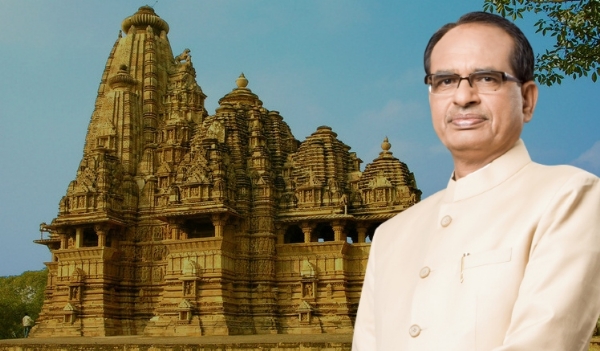NB Twitter Scan | Madhya Pradesh frees Hindu temples from government's control; What does it mean-
Total Views |
In April 2023, Madhya Pradesh Chief Minister Shivraj Singh Chouhan announced that the state government will not control any activities of temples. This came during a Parshuram Jayanti event in Bhopal when the chief minister stated, "We have decided that the government will relinquish control over temple activities, and the auction of temple land will be conducted by priests instead of collectors."

It is a significant move aimed at upholding the principles of religious freedom and decentralization of power. This decision has been included in the Madhya Pradesh cabinet, led by Chief Minister Shivraj Singh Chouhan. It made a landmark decision to facilitate the empowerment of priests and the relinquishment of government control over temple activities.
Notably, this decision will be valid for those temples holding a piece of land above 10 acres. While the priests can claim the amount earned from the auction of 10 acres of land, the amount generated from the sale/lease of over and above the 10 acres of land will go to the temple trust.
हमने फैसला किया है कि मंदिरों की गतिविधियों पर सरकार का कोई नियंत्रण नहीं रहेगा। मंदिर की जमीनों को नीलाम कलेक्टर नहीं बल्कि पुजारी कर सकेंगे।
— Shivraj Singh Chouhan (@ChouhanShivraj) April 22, 2023
निजी मंदिरों के पुजारियों को भी सम्मानजनक मानदेय देने की व्यवस्था की जाएगी। pic.twitter.com/QiMMREi6MI
This development marked a crucial step towards fulfilling Chouhan's promise to reduce bureaucratic interference and promote the autonomy of religious institutions in the state. This latest cabinet decision recognizes the pivotal role played by priests in the spiritual and cultural fabric of Madhya Pradesh.
Under the new policy, priests will be entrusted with various responsibilities, including the administration of temple funds, preservation of temple assets, and organization of religious ceremonies. This shift aims to ensure that the affairs of temples are managed efficiently and in line with the religious beliefs and customs of the devotees.
Finally Temples to be Free🔥
— The Jaipur Dialogues (@JaipurDialogues) May 22, 2023
Thread: pic.twitter.com/lyVJ8phKbr
The decision to relinquish government control over temple activities reflects Chief Minister Shivraj Singh Chouhan's commitment to minimizing bureaucratic interference in religious matters. By reducing red tape and streamlining administrative processes, the government intends to create a more conducive environment for the smooth functioning of temples and religious institutions.
The recent cabinet decision led by Chief Minister Shivraj Singh Chouhan reflects a commendable step towards fulfilling his promise of reducing government control over temple activities in Madhya Pradesh. By empowering priests and promoting their autonomy in managing temple affairs, the government aims to strike a balance between religious freedom and administrative oversight.
As the state embarks on this new chapter, it is anticipated that other regions across the country may also draw inspiration from this initiative to uphold the principles of religious freedom and decentralization.
Several Hindu organizations had called for such development especially in southern part of India where several temples are being destroyed and no action is being taken by the administration.
In December 2022, at a press conference, Vishva Hindu Parishad (VHP) working president Shri Alok Kumar said, “It is high time to liberate Hindu temples from government control”. "As per the data given to us by Acharya Sabha, over two lakh temples across India are under government control. These temples give Rs 1,80,000 crore to the governments per year. When the governments don’t run mosques, churches and gurudwaras, why do they take control over Hindu temples?” Alok Kumar asked.
VHP claims that since 1966, the organisation has saved 62 lakh Hindus from religious conversion and brought 9 lakh back to their original fold with respect. "Around 25 thousand Hindu daughters were also saved from getting trapped in the clutches of love jihadists," he informed.
Apart from VHP, the Rashtriya Swayamsevak Sangh (RSS) has long advocated for the liberation of Hindu temples from government control. The RSS has consistently emphasized that Hindu temples are subject to government oversight and expressed concerns that funds generated by these temples are being utilized for the upkeep of churches and mosques.

